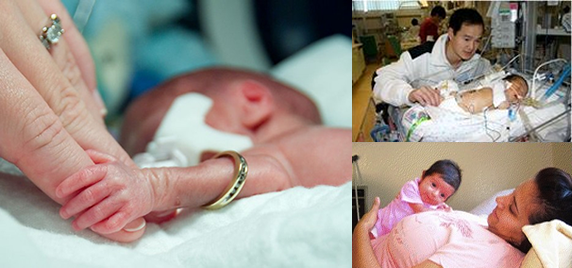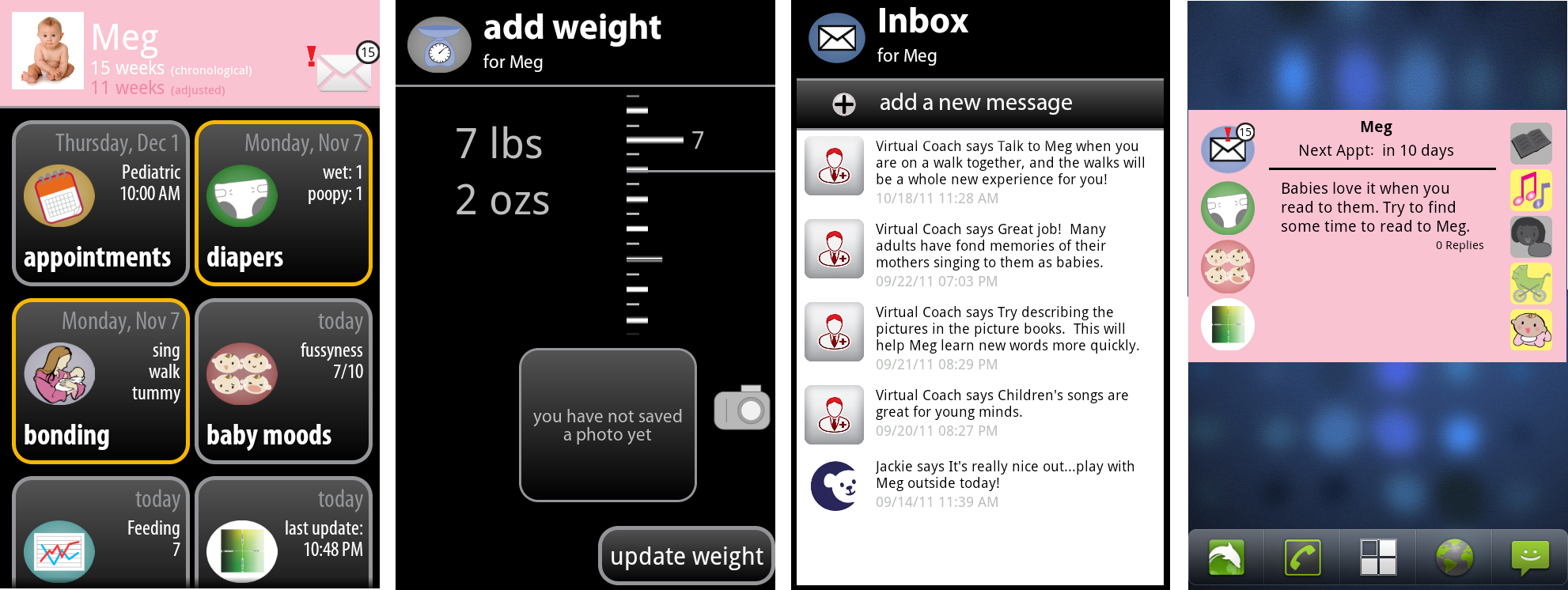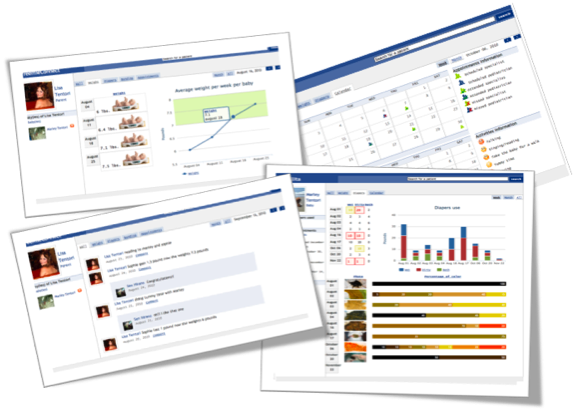
Research Team: Sen Hirano, Karen P. Tang, Dini Baker (EDAC/CHOC), Marni Nagel (CHOC)
Past Collaborators: Monica Tentori, Leslie Liu, Sheba George (CDU)
PIs: Gillian R. Hayes, Karen Cheng (CDU)
Premature birth is associated with long term health impairments including neurological and cognitive deficiencies, chronic lung disease, and altered growth patterns of lean, fat, and bone tissues. Furthermore, parents of premature infants may experience excessive stress, post-partum depression, and other challenges associated with the birth of and caring for their child.
We are designing, developing, and deploying an innovative and feasible mobile solution called Estrellita. This system is an automated capture and access tool that allows parents of premature infants to capture relevant information of their newly born child and share it with their healthcare providers, close relatives, and friends.
Estrellita includes two interfaces: a mobile application (Figure 1) and a web-based clinical interface (Figure 2). Using the mobile application, users can record observations of daily living (ODLs) for the infant and caregiver, share these data with clinical providers, and visualize past recorded ODL data. Through the website, healthcare providers can interact with the caregiver and keep abreast with the infant’s ODLs through a series of simple visualizations and data summaries.

Figure 1. Screenshots of Estrellita mobile application: main overview screen (leftmost), input screen for recording infant’s weight information (second from left), inbox for exchanging messages between caregivers and clinicians (second from right), a widget placed on the phone’s home screen (rightmost).

Figure 2. Screenshots of Estrellita’s web interface.
The mobile application allows caregivers to update their baby’s health information (Figure 1, leftmost), consult system-generated or clinical-generated warnings (Figure 1, second from the left), and update data about their own health and well-being (Figure 1, second from the right). Estrellita uses a widget to provide a glanceable view of their data and a quick way to access previously recorded information (Figure 1, rightmost). Caregivers can also flag data points that are troubling them so they can discuss them later with their clinicians.
The web-based interface allows clinicians to consult patient information through a dashboard-like interface (Figure 2). Representations of the patient’s data must be made accessible to caregivers as well as to healthcare professionals. These representations include both alerts and visualizations at levels appropriate for both caregivers and healthcare providers. The Estrellita website also allows caregivers and healthcare professionals to exchange messages with one another.
We are currently in the process of evaluating this system in a public clinic at Orange County, CA, USA.
This work is supported by Project HealthDesign, a national program of Robert Wood Johnson Foundation.
Check out our posts on the Robert Wood Johnson Project HealthDesign blog:
- Interpreting the Absence of Data (Nov ’11)
- The Challenges of Locating Parents of Preterm Infants (Oct ’11)
- Creating a Better World for Premature Infants (Sep ’11)
- Observing Fussy Babies and Their Fussy ODLs (Aug ’11)
- Using Cell Phones to Improve the Health of Babies and Children Around the World (Jul ’11)
- What’s in a Name? (Mar ’11)
- FitBaby on Cutting Edge of Affiliation Between University and Hospital (Dec ’10)
- A Reminder of the Important Work We Do (Oct ’10)
- Action Research: A cyclical intensity for sustainable social change (Sep ’10)
- In Assimilating ODL, Data Personal Experience Plus an Open Mind Equals More Effectiveness (Aug ’10)
- Strengthening Parent-Infant Bonds (Jul ’10)
- The relationship between ADLs and ODLs (this one is in Spanish too!) (Jun ’10)
- Are there ODL’s in Diapers? (Apr ’10)
- An introduction to our team (Mar ’10)
Recent publications and talks:
![]() Tang, K.P., Hirano, S.H., Cheng, K.G, and Hayes, G.R. (2012) Balancing Caregiver and Clinician Needs in a Mobile Health Informatics Tool for Preterm Infants. In Proceedings of the 6th International Conference on Pervasive Computing Technologies for Healthcare (Pervasive Health 2011), to appear.
Tang, K.P., Hirano, S.H., Cheng, K.G, and Hayes, G.R. (2012) Balancing Caregiver and Clinician Needs in a Mobile Health Informatics Tool for Preterm Infants. In Proceedings of the 6th International Conference on Pervasive Computing Technologies for Healthcare (Pervasive Health 2011), to appear.
![]() Tang, K.P., Cheng, K.G, Hirano, S., Nagel, M., Baker, D., and Hayes, G.R. (2011) Addressing the Design Challenges for a Clinically-Informed Data Capture Tool Targeted for Caregivers of Premature Infants. In Proceedings of Workshop on Interactive Systems in Healthcare (WISH 2011), 14-18.
Tang, K.P., Cheng, K.G, Hirano, S., Nagel, M., Baker, D., and Hayes, G.R. (2011) Addressing the Design Challenges for a Clinically-Informed Data Capture Tool Targeted for Caregivers of Premature Infants. In Proceedings of Workshop on Interactive Systems in Healthcare (WISH 2011), 14-18.
![]() Liu, L.S., Hirano, S.H., Tentori, M., Cheng, K.G, Park, S., and Hayes, G.R. (2011) Improving communication and social support for caregivers of high-risk infants through mobile technologies. In Proceedings of the ACM 2011 Conference on Computer Supported Cooperative Work (CSCW ’11), 475-484.
Liu, L.S., Hirano, S.H., Tentori, M., Cheng, K.G, Park, S., and Hayes, G.R. (2011) Improving communication and social support for caregivers of high-risk infants through mobile technologies. In Proceedings of the ACM 2011 Conference on Computer Supported Cooperative Work (CSCW ’11), 475-484.
Hayes, G.R., Patterson, D.J., Singh, M., Gravem, D., Rich, J., and Cooper, D. Supporting the Transition from Hospital to Home for Premature Infants Using Integrated Mobile Computing and Sensor Support. Personal and Ubiquitous Computing. In press.
Watch a video from Project HealthDesign describing Estrellita and the other associated projects.
Watch a talk Gillian gave at Microsoft Research that covers some of the autism and FitBaby work: http://research.microsoft.com/apps/video/default.aspx?id=121512 (March 2010)

One thought on “Estrellita: Helping Caregivers and Clinicians of Preterm Infants”
Comments are closed.